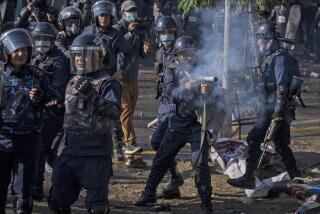Chinese Forces Arrest 60 Marchers in Tibet
- Share via
LHASA, Tibet — More than 60 marchers, with fists raised and chanting the name of Tibet’s exiled spiritual leader, the Dalai Lama, were arrested Tuesday after Chinese security forces moved in to break up the demonstration, the first since last week’s bloody independence protest that left at least 14 people dead and 69 injured.
Witnesses said that Tuesday’s march began at the Drepung monastery, several miles west of the capital, and involved about 100 people, believed to be Buddhist monks dressed in street clothes. The Drepung monastery is one of three leading monasteries whose members led last Thursday’s protests.
Western witnesses said a few were arrested along the way and that others left the march. About 60 marchers continued to the gate of the Tibetan regional government office in Lhasa, where about 100 security troops carrying submachine guns and automatic pistols immediately arrested them.
Tibetan sources said the military had taken control of all regional government offices. There were no reports of serious violence Tuesday.
More Unrest Expected
An American traveler who saw the march, Cliff Toliver of Cincinnati, said onlookers surged forward and shouted at one point when police and soldiers struck a marcher. But no clash ensued, and authorities broadcast an announcement over a public-address system urging observers to disperse, which they did.
The Chinese government on Monday dispatched about 1,000 security troops to the capital of this remote Himalayan region of 2 million people to guard against further unrest today, the 37th anniversary of the day China occupied Tibet. There have been reports that Buddhist monks are planning yet another demonstration today.
“We firmly oppose and will try to firmly stop those kinds of riots,” Communist Party spokesman Wu Xingtang told a news conference in Beijing on Monday. He accused foreigners of advocating independence for Tibet.
Police in Lhasa continued to man roadblocks, and Chinese travel officials said Tibet’s border with Nepal remained closed to incoming travelers.
However, except for the mid-afternoon confrontation with marchers, police kept a low profile Tuesday. A 10 p.m. curfew remained in effect, but enforcement appeared relaxed.
Plainclothes officers stood on the roof of the Jokhang Temple, Tibetan Buddhism’s holiest shrine, and watched the huge square below.
Hundreds of pilgrims Tuesday moved slowly around the temple, prostrating themselves and murmuring prayers. Hundreds more chanted prayers before smoke-darkened gilded images of Buddha inside the sprawling, whitewashed stone temple, the scene of last Thursday’s fighting.
At least 2,000 Tibetans demanding independence set fire to a police station and police vehicles and stoned officers during that protest. Chinese officials said six Chinese police officers were killed in the four-hour street battle.
In a report reaching Beijing early Tuesday, Western physicians visiting Lhasa said eight Tibetans and one Chinese had been killed. It was not immediately known if the Chinese was one of the police officers.
Unofficial estimates placed the number of injured at 50 Tibetans. The official news media said 19 police were injured.
Dalai Lama Blamed
Beijing has blamed the exiled Dalai Lama, Tibet’s spiritual leader, for inciting the demonstrations. The Dalai Lama led Tibet until China annexed it in 1950, enforcing a 700-year-old territorial claim. He fled in 1959 after a failed uprising and lives in India.
The U.S. State Department has condemned the violence in Tibet and Tuesday repeated the U.S. view that Tibet is part of China.
Also on Tuesday, the Senate voted 98-0 to link the future provision of defense material or services to China to a presidential certification that the Chinese government is “acting in good faith and in a timely manner to resolve human rights issues in Tibet.”
The resolution also calls on President Reagan to meet with the exiled Dalai Lama.
In Beijing, Western diplomats said that no government in the world would take up the cause of Tibetan independence.
However, they said more separatist trouble in Lhasa could spark protests from international church and human rights groups and cast a shadow over a big Communist Party Congress in Beijing later this month.
More to Read
Sign up for Essential California
The most important California stories and recommendations in your inbox every morning.
You may occasionally receive promotional content from the Los Angeles Times.













